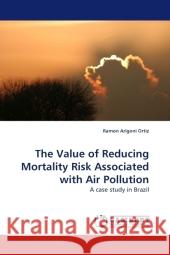The Value of Reducing Mortality Risk Associated with Air Pollution : A case study in Brazil » książka
The Value of Reducing Mortality Risk Associated with Air Pollution : A case study in Brazil
ISBN-13: 9783838323862 / Angielski / Miękka / 2009 / 280 str.
Air pollution is one of the most serious environmental health risks in developing countries. Epidemiologic studies have reported significant associations between urban concentrations of air pollution and mortality. Authorities are required to formulate and implement policies that aim to improve air quality, and cost-benefit analysis can be a useful tool to evaluate the environmental policy options. The monetary valuation of the mortality impact is an essential input to such cost-benefit analysis since the mortality effects correspond to the major component of the benefits of policies that improve air quality. This study estimates the willingness to pay (WTP) to reduce risks of death associated with typical air pollution policies and the value of a statistical life (VSL) in Sao Paulo, Brazil. It uses a methodology that has previously been tested in several industrialised countries, involving a computer-based contingent valuation survey. Two case studies compared the results obtained by using benefit transfer with the results using our estimates, suggesting that benefit transfer can result in inaccurate policy analysis.











